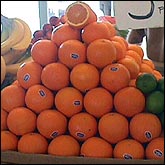Kepler's Conjecture
 Take a bunch of oranges that are similar in size and try to pack them into a cardboard box. What is the most efficient orange arrangement so that you fit the most oranges into the box? Should you stack them into identical layers so that you have the same number of oranges in each layer; or should you have each alternate layer have fewer oranges which fit into 'valleys' of the layer below; or should you just pile them irregularly into the box?
Take a bunch of oranges that are similar in size and try to pack them into a cardboard box. What is the most efficient orange arrangement so that you fit the most oranges into the box? Should you stack them into identical layers so that you have the same number of oranges in each layer; or should you have each alternate layer have fewer oranges which fit into 'valleys' of the layer below; or should you just pile them irregularly into the box?
This problem may seem simple enough to you, however many of the best mathematicians, including Harriot, Kepler and Hilbert, have thought about this problem throughout history. It was Kepler who first conjectured that the densest packing arrangement for identical spheres in a container is the one where each alternate layer has fewer spheres which fit into 'valleys' of the layer below. This arrangement is the same as the one you will most commonly see on fruit stands. The mathematical term for this arrangement is: 'face-centered cubic packing'. His conjecture was most probably based on simple experiments like the one you can do at home, however no one was able to mathematically prove it for almost 400 years!
In 1998, Dr. Thomas C. Hales, now a professor of mathematics at the University of Pittsburg, proposed his proof of Kepler's Conjecture. His proof is far from elegant. It involves over 250 pages of calculations and numerous computer calculations. The verdict is still not in as to whether he has 'really' proved Kepler's Conjecture, however so far, no opposition with a counter-proof has stepped forward.
About the Author
Anton Skorucak, MS
 Anton Skorucak is a founder and publisher of ScienceIQ.com. Anton Skorucak has a Master of Science (MS) degree in physics from the University of Southern California, Los Angeles, California and a B.Sc. in physics with a minor in material science from the McMaster University, Canada. He is the president and creator of PhysLink.com, a comprehensive physics and astronomy online education, research and reference web site.
Anton Skorucak is a founder and publisher of ScienceIQ.com. Anton Skorucak has a Master of Science (MS) degree in physics from the University of Southern California, Los Angeles, California and a B.Sc. in physics with a minor in material science from the McMaster University, Canada. He is the president and creator of PhysLink.com, a comprehensive physics and astronomy online education, research and reference web site.


